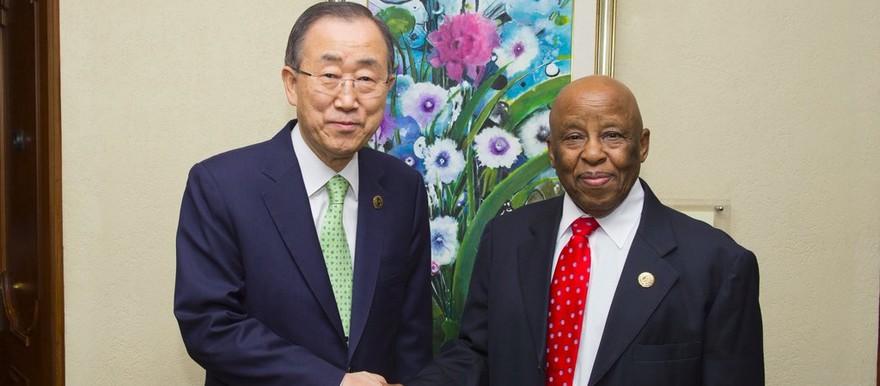The Chairman of the Joint Monitoring and Evaluation Commission (JMEC) Festus Mogae says that South Sudan should not be plunged back into war over the controversy of creation of 28 states.
President Salva Kiir has sought to establish 28 new states largely along ethnic lines, replacing the 10 existing states. He also appointed 28 governors from his party. His plan is rejected by the other two main signatories of the peace agreement signed last August, SPLM-IO and SPLM-FD. The SPLM-IO had been promised two of the country’s ten governorships according to the August peace deal.
Mogae, who is also the former president of Botswana, told the African Union Peace and Security Council that the effort by the South Sudanese government to create 28 states was a “violation” of the peace agreement and he blamed the government for creating an “impasse” that had also led to threats of war.
In a statement dated 29 January, Mogae said that the parties to the peace agreement must establish the transitional power-sharing government and must not allow the controversy over the 28 states to derail the agreement.
“We must also demonstrate to the Parties the absolute urgency in concluding the practical and security arrangements necessary to establish the Transitional Government of National Unity (TGoNU), and that, as important an issue it may be, the question of the number of states can be addressed through dialogue and a formal process of boundary review, but that this violation of the Agreement by the present Government should not be allowed to demolish the entire structure of the peace process.”
He added: “And it should also be clear to the parties that any further compromise here should not be understood as a precedent to discard other provisions of the Agreement.”
The former Botswana president last month had called on the government and SPLM-IO to negotiate a compromise over the states issue, but in his more recent statement he also cautioned that “continued re-negotiation of the terms of the Agreement is not an option that will be entertained.”
“The Government’s action has led to an impasse and a challenge in sequencing the implementation of the Agreement: it refuses to agree to a new text for the transitional constitution that does not provide for 28 states; the SPLM/A (IO) refuses a text that states anything other than 10 states, and has so far ruled out formation of the TGoNU on the basis of the Agreement, which is based on 10 states,” said Mogae. “What is clearly unacceptable is the rhetoric of some of those in favour of one configuration of states over the other, who have threatened war if there is any reversal in policy, and vice versa.”
The JMEC chairman did not name specific individuals who had threatened a return to war over the states.
But his remarks come after the Dinka Council of Elders warned of a possible return to war if their position on the 28 states is not respected. The tribal lobby group, which advises President Kiir, said that reversal of the decision was unacceptable.
“Reversing this popular decision will have dire consequences,” said Aldo Ajou Deng, a prominent member of the group, on 23 January. “The majority of our people who have been celebrating since December creation of more states will not accept and this will mean another war, which the council does not encourage.”
IGAD’s Council of Ministers, which was briefed by Mogae over the weekend, issued a resolution yesterday that stressed the need to form the national transitional government immediately in spite of the outstanding dispute over the 28 states.
The East African regional bloc took the position that the controversy within the constitutional review commission should not delay the new government because the peace agreement is supreme to the constitution.
IGAD “confirms that the Transitional Government of National Unity can be formed on the basis of the Agreement on the Resolution of Conflict in South Sudan, and the provisions which render it supreme to the constitution,” reads the ministers’ communique.
Separately, Mogae met with UN Secretary-General Ban Ki-moon on Saturday in Addis Ababa. In a statement after the meeting, Ban praised Mogae and he called on the South Sudanese parties to “make the necessary compromises.” He also referred to the possibility of “punitive measures” to pressure the parties.
Photo: Festus Mogae meets with Ban Ki-moon on Saturday in Addis Ababa
Related:
IGAD asks S Sudan to pause 28 states plan
Map analysis: Ethnic balance to change if 28 states approved




